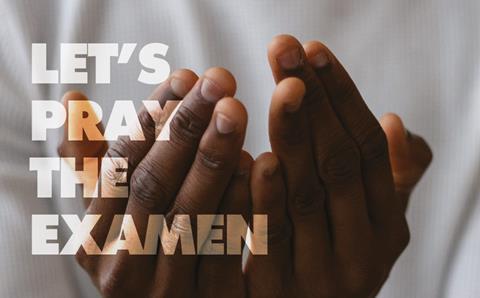Want to re-connect with God? Try praying the Daily Examen. Amy Boucher Pye explains how you can give it a go

Tanya wasn’t convinced. “Why do I need this?” she asked, wrinkling her nose. “I have enough negativity in my life already.”
“But it’s not a negative practice,” I replied. “It’s life-giving! I promise you.”
I was trying to convince my friend that the prayer of examen is not concerned with navel-gazing or listing all the sins we’ve committed. Rather, this form of prayer inspired by Ignatius of Loyola (1491–1556) can help us to discern whether we’re moving towards or away from God in our everyday lives. We can use it as a tool to notice how we’re partnering with God and how he’s inviting us to collaborate with him.
Ignatius developed this practice as a twice-daily routine to examine, or weigh, the conscience – which is where the name examen comes from. He advised people to follow a five step approach of looking back over the past hours with the help of the Holy Spirit. Because this is a dynamic way to pray that sparks renewal and spiritual growth, Ignatius valued it highly. In fact, he urged those in his religious order, the Jesuits, to keep praying the examen even if they became too busy for other prayers.
I first learned about the examen while studying for my MA in Christian spirituality. Gemma Simmonds, one of my lecturers, said: “I pray the examen as part of my end-of-day conversation with God and as a way of touching base with how things are in my inner world. I’m often super-busy and I find the examen an excellent safeguard against losing awareness of how God has been present to me in the details of the day with its demands, opportunities, conversations and feelings. It reminds me that no part of my life is beyond or unworthy of God’s touch.”
To Ignatius, ingratitude was the root of all sin. When we aren’t grateful, we don’t recognise the good things God gives us
The five steps
So what are the five steps of Ignatius’ examen? Here’s a quick overview. Remember, this prayer is not a moralistic code set to constrain us but an exercise to encourage freedom and individuality as we seek to serve Christ.
1. Give thanks
To Ignatius, ingratitude was the root of all sin. He remarked that when we aren’t grateful, we don’t recognise the good things God gives us. In contrast, giving thanks for God’s gifts engenders a sense of wonder over his creation. Therefore, we start the examen prayer by offering thanks to God. Sheridan Voysey, author and broadcaster, says: “I love the way that it starts with gratitude. Here is Ignatius writing in the sixteenth Century, and now all of this research comes out about the importance of gratitude for our wellbeing. Thanking God is a spiritual discipline.”
2. Ask for grace to know our sins and reject them
Ignatius recognised the importance of petition; that is, of asking God for help to develop and be changed. Seeking God’s grace reflects a partnership of love whereby God lovingly reveals our defects. This conversation doesn’t morph into a dour and introspective time of beating ourselves up over our sins. Instead, we understand God as our loving parent, not as a divine taskmaster or uninterested deity. Even when we receive God’s correction, we sense his boundless love for us.
3. Give an account of our thoughts, words and deeds
This step involves moving through the day’s actions and thoughts. We focus on the movement of our souls – how we reacted in various situations. When did we feel fear, boredom, joy, anger, peace, disgust or contentment? How did we move towards or away from God? Ignatius understood that the Holy Spirit brings to mind specific thoughts, responses and reactions and helps us grow in discernment.
4. Ask God to pardon our sins
Ignatius recognised that to experience freedom, people need forgiveness. He saw sin as “disordered attachments”, where our dreams, longings, hungers and desires keep us from following God. When we name our sins, we then ask God to forgive us. When we’re aware of the cost of our sins – that Christ died because of them – we can experience a deepening love for God and our neighbour.
5. Resolve to amend with God’s grace
In the fifth step, we look back over the day to discern our steps for the day to come. We converse with God about the hours that have passed and how we reacted as we anticipate moving forwards into the next day. Through this conversation we can uncover God’s loving surprises that will spur us on to growth and change.
When did we feel fear, boredom, joy, anger, peace, disgust, contentment? How did we move towards or away from God?
THE WEIGHT OF SIN
When Sheridan Voysey first started praying the examen, he was surprised at what he experienced. He guessed the practice might bring up ‘typical’ sins, such as anger, exaggeration or lust. But what he noticed most was annoyance: “I was feeling annoyed by the radical left and annoyed by the far right and annoyed by this person and that person…I wouldn’t say I was walking around as an absolute grump ‘because of the world and its idiots’. But the annoyance was there.”
For Voysey, praying the examen prompted him to deal with this emotion before it became rooted in him. He released his emotions to God, saying: “Lord, I don’t want to be an annoyed person. I want to walk through my days with joy, graciousness and gratitude.” Afterwards he noted that he felt lighter and freer, saying: “sin in any form is weighty. And even something small such as annoyance can drain us. That’s something that we often miss about holiness – God calls us to holiness for our own good.”
FINDING PEACE
Penelope Swithinbank, a spiritual director, used the examen with one of her directees. Laura was at a crossroads, facing a job redundancy and wondering if she should move closer to her ageing parents. Yet she wasn’t keen to leave her home and church, which she loved. She asked Swinthinbank: “How do I know what God’s plans are for me? What if I step out of his plans?”
Swinthinbank set Laura the challenge of detecting God’s presence in her life: “Prayerfully ask yourself two sets of questions each night for the next month,” she said. “For what I am thankful today? Where did I see God working? Where have I known joy? And where did I fail God today? When did I lack peace? When did I lack contentment?”
A month later, Laura was no longer overcome with worry: “God’s plan is for me to be more like Christ in my everyday life. Where I live or what job I do is secondary,” she said. She still faced big decisions but remarked that “now they’re based on a relationship with God and not on my fears and worries. And that’s made a huge difference to my everyday life.” Praying the examen every night also affected Laura physically. She said that it had “not only led to extraordinary peace but a much better night’s sleep”
For Karen Turnbull, a busy community pastor and mum, finding the time to pray was a challenge. Like many of us, she regularly ended her day by flopping on the sofa and scrolling through her phone. But she found the examen a “life-giving oasis in the day”. She observed: “Life is so busy, I feel like I run from one end of the day to the other without a pause for breath. But time seems to stand still in the examen and I have space to sit with Jesus and review my day. I find him such a patient, compassionate and thoughtful companion.”
TWO PRONGED QUESTIONS
Ignatius always emphasised our freedom, so if you find praying the five-step examen too formal or monotonous, or you struggle to incorporate it into your daily life, experiment with what works best for you. Here are some questions to consider at various moments in the day. Ponder them with God, asking for insight and wisdom.
For what am I most grateful?
For what am I least grateful?
When did I feel most alive today?
When did my energy drain out of me?
When did I most feel like myself today?
When did I feel most disjointed?
What brought me joy?
What annoyed me?
God calls us to holiness for our own good
Now, she wouldn’t be without this practice. “The examen has been part of a sea-change in the way I relate to God and truly has been life-giving in the middle of some big challenges.”

Let’s pray the examen
Set aside just 15 minutes; if you keep the time short and concise, you’re more likely to stick with it. You might want to write out your prayers or speak them to God
1. Give thanks. Turn your heart to God in thanks, naming specific things for which you’re grateful.
2. Ask. Invite God to dwell with you through the Spirit and Son as you seek his strength, wisdom and insight.
3. Review. Consider your words, thoughts and actions throughout the day, and why you responded as you did. Where and when did you move towards God, and why? Where and when did you move away from him? Why?
4. Repent. Ask God to forgive you for the ways you failed, and receive forgiveness through his love and grace.
5. Renew. While conversing with God, look forward to tomorrow, making plans for how you want to live as a child of God.
You could also use the above structure to review your past year, and pray into the next twelve months.
EMBRACING FREEDOM
When you’re praying the examen, trust that God will collaborate with you. As you talk with him about the events of the day, the Spirit will bring to mind memories and insights. As we see how we are moving towards or away from him, we come to understand ourselves more as God sees us. We grow in wisdom and discernment and can embrace the freedom to live and love God and our neighbour. My friend Tanya Marlow says three things stand out to her about praying the examen: Firstly, it isn’t like handing in a report card to God, as you would a stern headteacher; instead it involves a sense of co creation. Secondly, the process is based on the premise that God loves us deeply. And thirdly, our emotions can provide clues to what needs changing in our lives. If we can come to the process with that understanding, “maybe,” she says with a smile, we could believe “that the examen could be positive after all.”

Amy is a regular contributor to Premier Woman Alive. To subscribe and read more from her, visit womanalive.co.uk


































